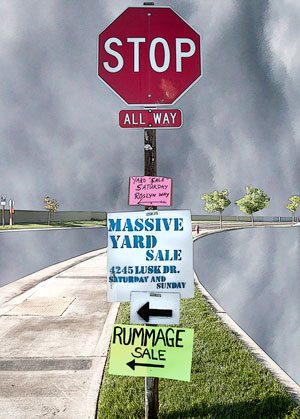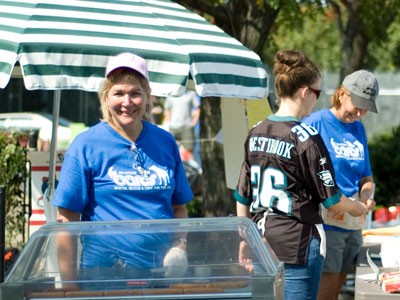
If you’ve been hankering to do a story on the second-hand economy, used goods or tag sales, all of the stars are aligning to make the coming week a perfect one. First, we have National Garage Sale day on Aug. 10, and National Bargain-Hunting Week kicked off on Monday, running through Aug. 11. (These grass-roots observances are far from “official” but do seem to have a certain following.)
Also starting today is what’s billed as the World’s Longest Yard Sale, a roadside event that stretches along the Highway 127 corridor from Alabama to Michigan; it always gets lots of publicity, as do its imitators along other roadways like U.S. 40, U.S. 12, etc. I did the 127 yard sale several years ago; our mantra was “I found heaven on route 127 — fun! And so from firsthand experience I advise you to check in on spinoff business to motels, restaurants, liquor stores and the like from trekkers plying the highways in search of vintage bargains at organized yard sales, flea markets, swap meets and other used-goods venues that may be setting up shop in your area this late summer or early fall.
The secondhand market for items ranging from ordinary household goods like books, tools, children’s supplies and housewares to collectibles and knickknacks is a fascinating part of the economy and one that doesn’t get as much attention as it should, particularly with so many people still in survival mode after the Great Recession. For this story, you might want to focus on person-to-person transactions via yard sales, estate sales, or at most Craigslist ads, rather than used-goods retailers, thrift shops and other commercial outlets. (Though they make good stories too, separately).
It’s not easy to come by professional measures of the second-hand or used-goods economy — maybe because transactions involving used goods aren’t counted in the measure of the nation’s Gross Domestic product, on the theory those items were accounted for the first time around, when they were new. You might try economists at area universities, or your region’s branch of the Federal Reserve, for comments and thoughts. It’s common sense that bargain-hunting ramps up when times get tough, and one way to stretch meager income is to buy used, and that people will be parting with treasures if financial need arises. That this still is the case years after the official end of the recession is your current news peg.
So even if quantitative date is not available, the garage-sale angle can flesh out human interest stories about the jobs market, the housing market and the general economy. For example, here’s a U.S. News & World Report piece, “Garage sales go glam,” and his year-old post from Wall Street Journal columnist Michael Silverstein; his observations jive with mine: Lately, garage- and tag-sale holders seem in it for the money, not for the opportunity to declutter, and they are selling nicer stuff and driving harder bargains.
Be sure to speak to municipal officials about community rules for garage sales; are they having to rein in people who are running sales to frequently, or otherwise seeing any signs that selling off household belongings is more than a decluttering lark for local residents? (Remember, few city officials want to admit their community may be less-than-prosperous, so that line of questioning requires a degree of tact.)
It may be anecdotal, but several of my neighbors have sold items they were rather fond of, because they wanted the cash instead. As a journalist, use these sales as entrée into the world of real people — what patterns do you see in pricing, in merchandise, in marketing tactics? Talk with people — why are they having a sale now? Are the proceeds earmarked for anything in particular? Of all the items they are selling at a fraction of original value, do they regret any purchases? In hindsight, would they do without some of the sporting gear, big-ticket electronics, costume jewelry or Lego sets in lieu of beefing up retirement or emergency savings? It’s your chance to do what I long ago dubbed “financial anthropology.”
Other ideas: Check out spin-off businesses, like websites that advertise garage sales, consultants who help organize them, and junk haulers who take the leavings. And contact the moderators of your area Freecycle groups; I’ve long thought that this online resource would make a great economic indicator; are pleas from people in hardship tracking or bucking jobs market developments and other economic metrics? Are posters offloading fewer big-ticket items, or otherwise changing their giveaway patterns?










